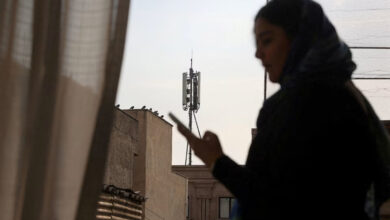TUNIS – Tunisian police on Sunday arrested dozens of Islamist demonstrators set on attacking the offices of a television channel that had shown the award-winning film "Persepolis," officials said.
The assault is the latest in a rise in attacks against perceived symbols of secularism by hardcore Muslims in Tunisia ahead of this month's election. Once suppressed by the former regime, conservative Muslims are increasingly making themselves heard in the country's politics.
Interior Ministry spokesman Hichem Meddeb said police blocked the attackers before they could reach the offices of the Nessma private television channel in the center of Tunis and arrested around 50 of them.
Meddeb said there were also casualties, without specifying how many, and emphasized "authorities' determination to oppose troublemakers."
The head of Nessma, Nabil Karoui, said that the attackers were angered by the channel's recent showing of "Persepolis," Marjane Satrapi's moving and humorous adaptation of her graphic novels about growing up during and after Iran's 1979 Islamic Revolution. He said they consider it hostile to their religious convictions.
The film won the jury prize at the 2007 Cannes Film Festival.
"These extremists want to impose a new dictatorship," Karoui told The Associated Press. "We are channel for liberty, modernism and democracy. We will not back down and will continue to follow our independent editorial line."
Later in the afternoon there were new clashes between police and conservative Islamists in the capital's lower income neighborhood of Jebel Lahmar near the campus of Tunis University, according to eyewitnesses.
Hundreds of demonstrators left the mosque following afternoon prayers and threw rocks at police who responded with tear gas, according to local resident Mokhtar Ouertani.
He said the protest was over the broadcast of Persepolis as well as a state policy banning the conservative Islamic face veil for university students.
Tunisians are set to hold landmark elections for a constitutional assembly in just two weeks after overthrowing their long-serving dictator in a popular uprising in January.
The ensuing nine months have been filled with unrest and demonstrations as well as the rise of a new ultraconservative group of Muslims that had kept a low profile under the largely secular regime of former President Zine El Abidine Ben Ali.
Salafists, as the conservatives are known, attacked a movie theater showing film they deemed insulting to Islam on June and just last Thursday a university dean said his campus was also attacked.
Moncef Ben Abdeljelil, head of Sousse University's school of humanities, said four people armed with knives threatened university staff because they would not enroll students wearing the conservative Muslim face veil.
On Saturday, another 200 students invaded the college waving signs demanding students wearing the face veil be allowed to enroll.
Under Ben Ali, outward manifestations of piety were strongly discouraged and since his ouster, conservative Islam has seen a resurgence.
The front-runner in the polls is expected to be the Ennahda Party, a moderate Islamist movement that had been severely repressed under the previous regime.
On Saturday, 200 women demonstrated in the capital Tunis to denounce the "forces of backwardness and the fanatics."



